
2025
Brenna
Stollery Children’s Hospital Foundation
Brenna is a smart, energetic and independent teenager who has even taught herself how to play guitar. After a mental health crisis and subsequent treatment by her team at the Stollery Children’s Hospital, Brenna uses her experience to advocate for mental health.
Brenna was diagnosed with anxiety when she was in Grade 3, and she received a couple other mental health diagnoses throughout her childhood. In 2022, she was going through a very difficult time with her mental health. Her parents saw that she was struggling. She had supports with their family doctor and community resources, but in October 2022, Brenna was in crisis, so she was brought to the Stollery Children’s Hospital.
Once connected to the Stollery team, she was given a formal ADHD diagnosis. Brenna was prescribed medication to help stabilize her life and this helped her realize that a lot of the things she struggled with in her life were because of her undiagnosed disorder.
Today, Brenna is in a way better place. Thanks to the expert care she received at the Stollery, Brenna’s able to forge her own path.

I feel hopeful, as if my story was not meant to be over. And I would not be able to share it if it weren't for my support system.
— Brenna, 18 - Received support for ADHD, depression & Tourette’s
2025
Andie
Children’s Health Foundation
At just nine weeks old, Andie was diagnosed with a rare blood disorder called Diamond Blackfan Anemia. At seven, Andie’s mind was so busy with worries about her health that she saw her first therapist at Children’s. At 13 years old, Andie was busy exploring life: school, friends and the daily challenges of being a teenager. But she was different. Andie missed school about twice a month, often more and no one at school quite understood.
Andie’s loneliness grew when she needed a feeding tube. Suddenly, she couldn’t eat like everyone else, had to track her weight every day and was diagnosed with another rare disease in her digestive system.
Quickly, Andie’s worries turned into anxiety. Then panic attacks that felt like she couldn’t breathe. Her relationship with food soured, and depression crept in.
So, for the second time in her life, Andie started therapy. This time Andie says, “Therapy changed my life around. Having someone safe to talk to and learning coping skills to manage my anxiety and depression, helped me feel like me again!”
Very few people know Children’s Hospital better than a lifelong patient like Andie. For her, and the nearly 60,000 children and youth who need Children’s every year, access to world-class mental health care is vital.


Thanks to incredible support, I’ve made real progress. I'm not perfect—but I’m proud, healing, and ready to share my story.
— Andie, 17 - Received support for anxiety, depression & trauma

2025
Mackenzie
Janeway Children’s Hospital Foundation
Mackenzie is a successful singer, songwriter, and university student who has a love for music and a powerhouse voice. Living with anxiety and depression, she faced challenges as a child, but with the right support, she was able to navigate them and build a bright future. Thanks to generous donor support, Mackenzie had access to essential tools, therapy resources, specialized programs, and a community of care at the Janeway that helped her grow into the thriving young woman she is today.
Because she got the help she needed as a child, Mackenzie has been able to flourish as an adult. The Janeway was more than a hospital,it was a place of encouragement, learning, and hope. Now, she’s using her voice to inspire others, proving that with the right care, every child can grow into their full potential.
Your support gives kids like Mackenzie the foundation they need to thrive, not just today, but for a lifetime.

Without the help from the Janeway Children’s Hospital I wouldn’t be the person I am today. I am beyond grateful I can share my story in hopes to shed light on mental illness.
— Mackenzie, 20 - Received support for anxiety & depression
2025
Victoria
CHU Sainte-Justine
Victoria was always a very shy and quiet kid, but when she was diagnosed with leukemia at 10 years old, her shyness kept her from being able to share her symptoms with her care team. Sainte-Justine was able to support her through her physical diagnosis, and also support her mental health. Through specialized and personalized programs at Sainte-Justine, she was able to partake in art therapy, wellness activities, & culinary workshops, as well as meetings with psychologists and psychosocial workers that were critical to her finding acceptance, confidence, and new ways to express herself. Victoria came out of cancer treatment stronger than ever before.


Thanks to the Sainte-Justine team, and the support I received for my physical and mental health, I was able to keep a positive outlook when I was sick and going through cancer treatment. I wouldn’t be who I am today without their support.
— Victoria, 16, received support during and after her cancer treatment to help manage the mental health effects of her experience

2024
Mia
IWK Foundation
Mia was particular with foods and dirt when she was young, but as she got older, things escalated. The compulsions began to impact Mia’s life and health severely, and in junior high, training for the Canadian Cheer National Championships, she started to feel anxious and nervous to the point it was affecting her performance. In March 2020, Mia, then 15, was diagnosed with obsessive-compulsive disorder (OCD). Mia’s family doctor knew she needed specialized help and referred her to the IWK for an appointment with mental health clinician, Dr. Bradley. That appointment was life-changing for Mia and her family, and today Mia is in university, doing what she loves to do, because she got support at the IWK.

It feels great to be in a healthy mindset. It allows me to pursue my dreams and be an advocate for youth mental health.
— Mia
2024
Nève
CHEO
Nève’s CHEO story begins in September of 2021. Her family knew she had been struggling, but one day at school, she was having suicidal thoughts and was seriously considering acting on them. Her mom knew she needed support right away and brought her to CHEO. What followed was a two-week admission to CHEO’s inpatient mental health crisis unit. Since then, she’s visited CHEO a few other times, participating in individual therapy, group therapy and has found the right medications. At CHEO and at home, Nève has been working hard to heal. She feels part of that healing is sharing her story; bringing catharsis from helping others who follow her by showing them they are not alone and ending the stigma surrounding mental health challenges. Nève is back to dancing competitively and enjoying time with friends & family. She now feels that she’s back on solid ground.
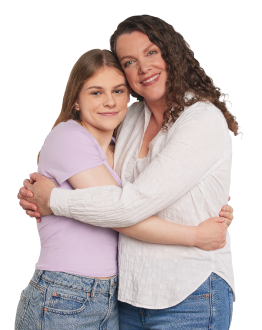

It feels good to be excited about my life again.
— Nève
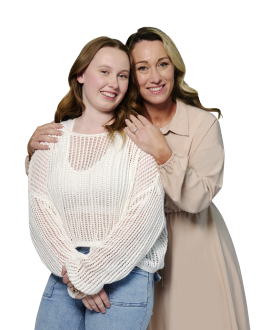
2024
Keira
BC Children’s Hospital
Keira is remarkable and resilient. When she was 9, Keira suffered a severe burn to her mid-body region which led to complications such as sepsis. The trauma of the burn led Keira to the psychologists at BC Children’s Hospital. They were able to support her through the entire experience, helping her come to terms with the event and work through it. Keira, still feels a connection to the doctors and nurses at BC Children’s Hospital and feels empowered now to share her story with others.
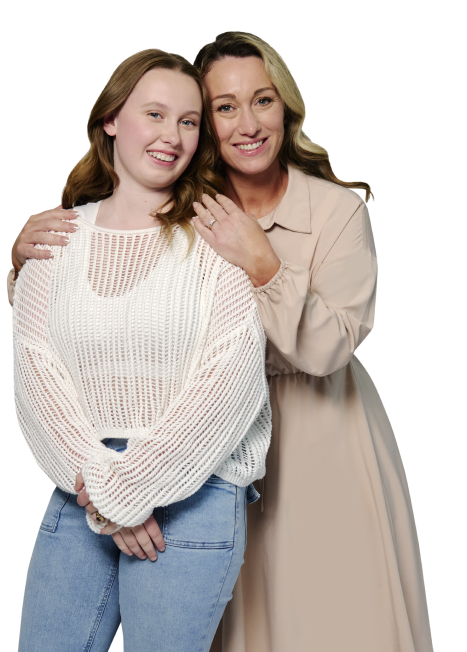
I feel a strong sense of connection with my doctors and nurses and also the mental health supports and services at BC Children’s Hospital.
— Keira
2023
Canon
IWK Foundation
In early 2022, the Beazley family was celebrating the completion of the then 12-year-old Canon’s cancer treatment. However, this celebration was short-lived as Canon, while physically healthy, began experiencing panic attacks. He was diagnosed with Post Traumatic Stress Disorder (PTSD) stemming from his cancer experience.
Canon began regularly scheduled therapy sessions with the IWK’s mental health team and medication to manage his anxiety. His family immediately noticed a big change. He became more present, able to function and could actively participate in his therapy. Thanks to this support Canon is back to being a kid and enjoying the activities he loves.

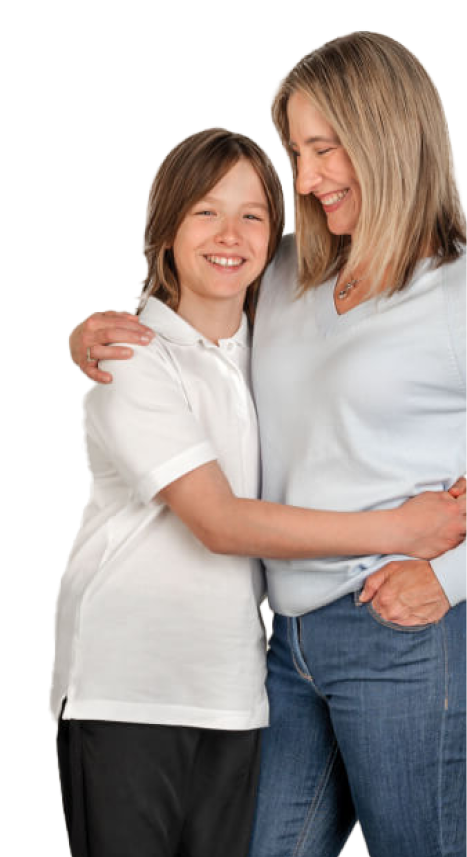
Similar to Canon's cancer, his mental health condition was insidious and unexpected. We were at a loss as to what to do, but thankfully the team at the IWK was able to unpack, diagnose and successfully treat the problem. He's back to his former self, thriving at every level. We couldn't be happier or more appreciative for his care.
— Dan & Shelly Beazley, Canon’s parents
2023
Taylor
Alberta Children's Hospital Foundation
Taylor began struggling with her mental health in junior high when constant bullying from classmates led her to try to take her own life. Thankfully she received help at the Alberta Children’s Hospital’s mental health unit where she received a diagnosis of anxiety and depression and learned techniques to help her manage her mental health.
The support she received and gratitude she has for her mental health team at the hospital has compelled Taylor to share her story to offer hope to other young people walking the same path as her own.


Over this last decade, I’ve learned so much about myself and I’ve worked so hard to get to the place I’m at. It hasn’t been easy. There have been good days and bad days, good seasons and bad seasons. However, I respect my own mental capacity and own emotional wellbeing. There was a time when I feared the future so deeply, I didn’t want to live. Now, thanks to the help I received at the Alberta Children’s Hospital, I am excited for what tomorrow brings.
— Taylor, now 22
2023
Chloé*
The Montreal Children’s Hospital Foundation
Chloé* was only 7 when she started to have disordered eating. At first, the symptoms were subtle but, during the pandemic, her eating habits took a turn for the worse. Unbeknownst to her family, Chloé, who was by then 9, stopped eating altogether. Within three weeks, she lost 8 kgs and her weight plummeted to a mere 28 kgs.
At the start of Family Based Treatment it took six hours of urging, cajoling, and reassuring to get Chloé to just eat 6 pieces of tortellini. It took two long years before Chloé overcame her eating disorder, but for the past six months, Chloé, has been doing well. She is at a healthy weight. She is smiling again and eating like a regular kid.
*Patient has requested their name be change.
Funding means we can add more therapy hours to the eating disorders program, therefore reducing waiting times and allowing more young patients to receive front-line treatment.
— Dr. Holly Agostino, Director of the Eating Disorders Program at The Montreal Children’s Hospital
2023
Kaden
MacKids
Kaden wasn’t even in middle school when a heavy and inexplicable sadness started to settle over them. Insomnia and hallucinations followed and Kaden, who had always been bubbly and outgoing, started to turn inwards. A visit to the family doctor altered Kaden’s parents to the true depths of their child’s inner distress and began what has been an ongoing journey of healing and hard work.
Today, Kaden and their family are hopeful. While Kaden, still deals with mental health challenges, the child and youth mental health programs at McMaster Children’s Hospital has helped them and their family feel safe and supported, and has empowered them with healthy coping strategies to manage symptoms and respond to crises.
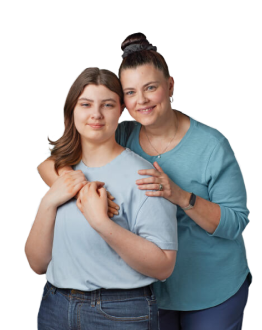
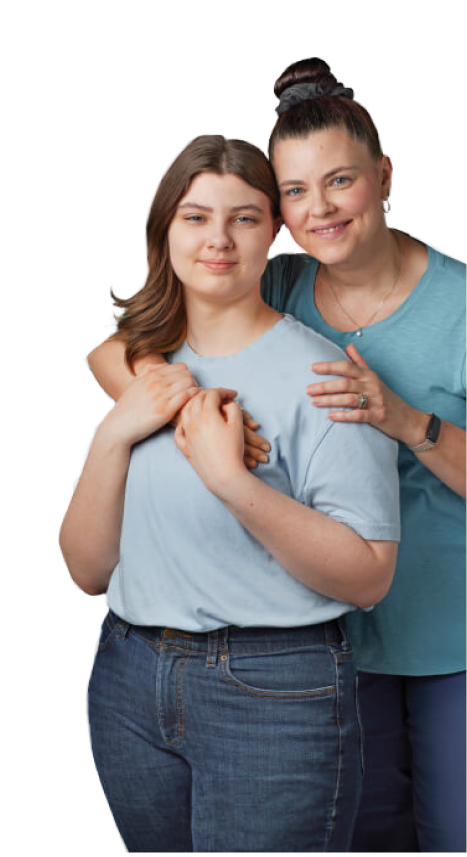
Living with mental illness is very, very difficult for a child and their family, and can be quite disabling if it's not treated early. With a family approach, we do that. I feel privileged to be able to offer such high quality care to help children get as well as they can.
— Dr. Khrista Boylan, McMaster Children’s Hospital

2023
Dr. Julia Young
The Hospital for Sick Children
For the neuropsychology team at The Hospital for Sick Children (SickKids), the biggest concern right now is being able to shorten wait times so they can see more patients. When it comes to helping young people, there are developmental windows where, if provided with the right supper at the right time, they can be set up for long-term success. The team never wants to risk missing this window, as the consequences can be significant. With the help of Family of Support, SickKids’ neuropsychology team will be able to build up their capacity and connect more kids & youth with the right supports. As with all our partner hospitals, Family of Support is ensuring SickKids can make progress towards this goal of faster access.

Timely intervention is always important in medical care, but when it comes to developing brains, timing is everything… We know we can offer meaningful help once we’re able to assess young people and connect them with resources - it our waiting list that keeps us up at night.
Dr. Julia Young, part of the neuropsychology team at SickKids
2023
Christina Carr
McMaster Children’s Hospital
The I AM SAFE intervention is a clinical trial currently underway at McMaster Children’s Hospital and The Hospital for Sick Children (SickKids) with plans to launch at the Alberta Children’s Hospital soon. The program highlights the importance of communication with young people and provides follow-up support to those young people who have come to the hospital because of suicidal ideation or an attempt. While it may seem strange to describe I AM SAFE as a prevention program, the follow-up support offered through I AM SAFE is designed for prevention. We have therapists work with patients and families to build the tools to prevent further deterioration and/ or a recurrence of the patient’s mental health crisis. Family of Support has been helping fuel I AM SAFE for the past three years, giving clinicians the opportunities to deliver promising intervention while strengthening collaborative research relationships across the network of 13 Canadian Children’s Hospitals.

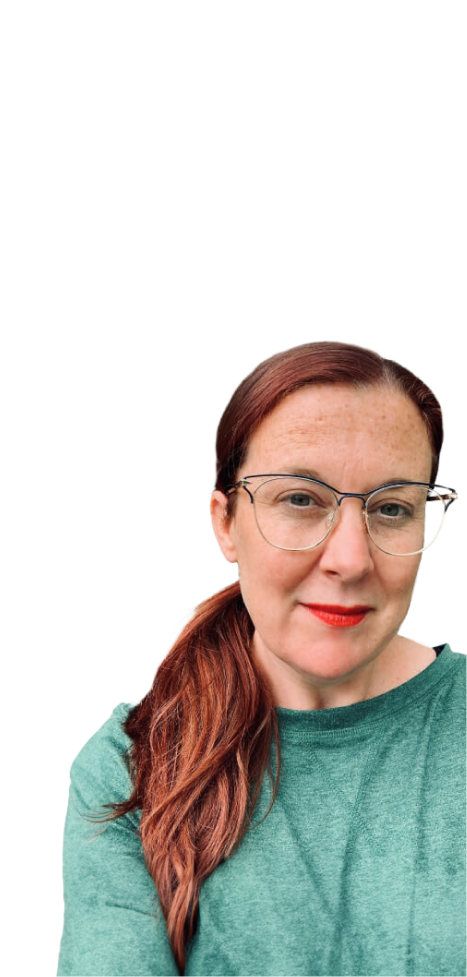
The privilege of taking on the role of the I AM SAFE research therapist has helped me to see – firsthand – the importance of working on communication between the youth and family immediately after discharge. By identifying and working on communication deficits immediately at the start of the program, I have been able to help families work through these barriers.
— Christina Carr, I AM SAFE intervention therapist, McMaster Children’s Hospital

2022
Tracy Palmquist
Alberta Health Services
Few would argue that early intervention is not an important goal in child and youth mental health. But, it can be difficult for prevention-oriented initiatives to attract attention and support when so much of the mental health space is focused on crisis intervention - whose impact is so clear and can be life-saving. All that said, the pandemic gave us a glimpse of what the world could look like without prevention.
Over the past three years, Family of Support’s investments in prevention and early intervention – including through the dissemination of mental health training and knowledge – have been building exactly the capacities that the COVID-19 pandemic stripped away. Now more than ever, we need to support our institutions working to be better at noticing, identifying, and responding to mental health challenges.
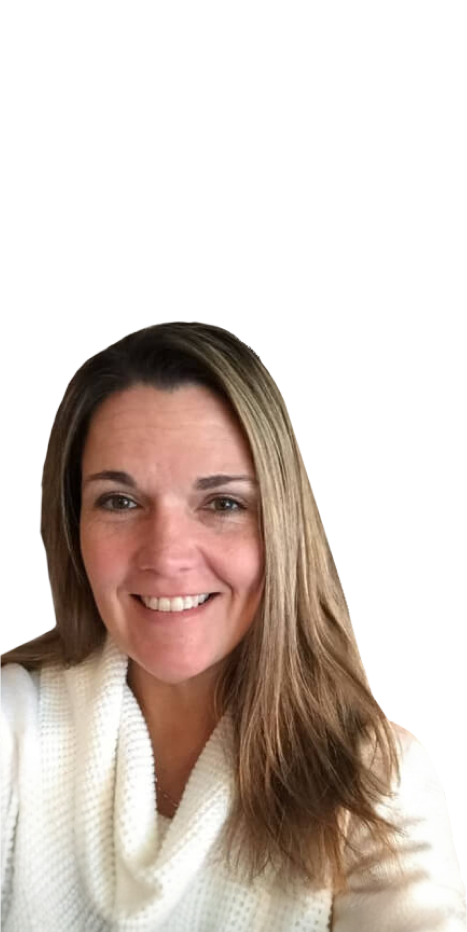
For close to two years, almost no one connected to public systems regularly had eyes on kids. Because of the Family of Support initiative, hospitals and communities are becoming better equipped to notice, identify and respond to early manifestations of mental health challenges – a practice whose value has never been more clear.
— Tracy Palmquist, Director, Children, Youth & Families, Addiction & Mental Health at Alberta Health Services
2024
Nève
CHEO
Nève’s CHEO story begins in September of 2021. Her family knew she had been struggling, but one day at school, she was having suicidal thoughts and was seriously considering acting on them. Her mom knew she needed support right away and brought her to CHEO. What followed was a two-week admission to CHEO’s inpatient mental health crisis unit. Since then, she’s visited CHEO a few other times, participating in individual therapy, group therapy and has found the right medications. At CHEO and at home, Nève has been working hard to heal. She feels part of that healing is sharing her story; bringing catharsis from helping others who follow her by showing them they are not alone and ending the stigma surrounding mental health challenges. Nève is back to dancing competitively and enjoying time with friends & family. She now feels that she’s back on solid ground.


It feels good to be excited about my life again.
— Nève

2024
Mia
IWK Foundation
Mia was particular with foods and dirt when she was young, but as she got older, things escalated. The compulsions began to impact Mia’s life and health severely, and in junior high, training for the Canadian Cheer National Championships, she started to feel anxious and nervous to the point it was affecting her performance. In March 2020, Mia, then 15, was diagnosed with obsessive-compulsive disorder (OCD). Mia’s family doctor knew she needed specialized help and referred her to the IWK for an appointment with mental health clinician, Dr. Bradley. That appointment was life-changing for Mia and her family, and today Mia is in university, doing what she loves to do, because she got support at the IWK.

It feels great to be in a healthy mindset. It allows me to pursue my dreams and be an advocate for youth mental health.
— Mia
2024
Victoria
CHU Sainte-Justine
Victoria was always a very shy and quiet kid, but when she was diagnosed with leukemia at 10 years old, her shyness kept her from being able to share her symptoms with her care team. Sainte-Justine was able to support her through her physical diagnosis, and also support her mental health. Through specialized and personalized programs at Sainte-Justine, she was able to partake in art therapy, wellness activities, & culinary workshops, as well as meetings with psychologists and psychosocial workers that were critical to her finding acceptance, confidence, and new ways to express herself. Victoria came out of cancer treatment stronger than ever before.


Thanks to the Sainte-Justine team, and the support I received for my physical and mental health, I was able to keep a positive outlook when I was sick and going through cancer treatment. I wouldn’t be who I am today without their support.
— Victoria, 16, received support during and after her cancer treatment to help manage the mental health effects of her experience

2024
Keira
BC Children’s Hospital
Keira is remarkable and resilient. When she was 9, Keira suffered a severe burn to her mid-body region which led to complications such as sepsis. The trauma of the burn led Keira to the psychologists at BC Children’s Hospital. They were able to support her through the entire experience, helping her come to terms with the event and work through it. Keira, still feels a connection to the doctors and nurses at BC Children’s Hospital and feels empowered now to share her story with others.

I feel a strong sense of connection with my doctors and nurses and also the mental health supports and services at BC Children’s Hospital.
— Keira
2023
Canon
IWK Foundation
In early 2022, the Beazley family was celebrating the completion of the then 12-year-old Canon’s cancer treatment. However, this celebration was short-lived as Canon, while physically healthy, began experiencing panic attacks. He was diagnosed with Post Traumatic Stress Disorder (PTSD) stemming from his cancer experience.
Canon began regularly scheduled therapy sessions with the IWK’s mental health team and medication to manage his anxiety. His family immediately noticed a big change. He became more present, able to function and could actively participate in his therapy. Thanks to this support Canon is back to being a kid and enjoying the activities he loves.


Similar to Canon's cancer, his mental health condition was insidious and unexpected. We were at a loss as to what to do, but thankfully the team at the IWK was able to unpack, diagnose and successfully treat the problem. He's back to his former self, thriving at every level. We couldn't be happier or more appreciative for his care.
— Dan & Shelly Beazley, Canon’s parents
2023
Taylor
Alberta Children's Hospital Foundation
Taylor began struggling with her mental health in junior high when constant bullying from classmates led her to try to take her own life. Thankfully she received help at the Alberta Children’s Hospital’s mental health unit where she received a diagnosis of anxiety and depression and learned techniques to help her manage her mental health.
The support she received and gratitude she has for her mental health team at the hospital has compelled Taylor to share her story to offer hope to other young people walking the same path as her own.


Over this last decade, I’ve learned so much about myself and I’ve worked so hard to get to the place I’m at. It hasn’t been easy. There have been good days and bad days, good seasons and bad seasons. However, I respect my own mental capacity and own emotional wellbeing. There was a time when I feared the future so deeply, I didn’t want to live. Now, thanks to the help I received at the Alberta Children’s Hospital, I am excited for what tomorrow brings.
— Taylor
2023
Chloé*
The Montreal Children’s Hospital Foundation
Chloé* was only 7 when she started to have disordered eating. At first, the symptoms were subtle but, during the pandemic, her eating habits took a turn for the worse. Unbeknownst to her family, Chloé, who was by then 9, stopped eating altogether. Within three weeks, she lost 8 kgs and her weight plummeted to a mere 28 kgs.
At the start of Family Based Treatment it took six hours of urging, cajoling, and reassuring to get Chloé to just eat 6 pieces of tortellini. It took two long years before Chloé overcame her eating disorder, but for the past six months, Chloé, has been doing well. She is at a healthy weight. She is smiling again and eating like a regular kid.
*Patient has requested their name be change
Funding means we can add more therapy hours to the eating disorders program, therefore reducing waiting times and allowing more young patients to receive front-line treatment.
— Dr. Holly Agostino, Director of the Eating Disorders Program at The Montreal Children’s Hospital
2023
Kaden
MacKids
Kaden wasn’t even in middle school when a heavy and inexplicable sadness started to settle over them. Insomnia and hallucinations followed and Kaden, who had always been bubbly and outgoing, started to turn inwards. A visit to the family doctor altered Kaden’s parents to the true depths of their child’s inner distress and began what has been an ongoing journey of healing and hard work.
Today, Kaden and their family are hopeful. While Kaden, still deals with mental health challenges, the child and youth mental health programs at McMaster Children’s Hospital has helped them and their family feel safe and supported, and has empowered them with healthy coping strategies to manage symptoms and respond to crises.


Living with mental illness is very, very difficult for a child and their family, and can be quite disabling if it's not treated early. With a family approach, we do that. I feel privileged to be able to offer such high quality care to help children get as well as they can.
— Dr. Khrista Boylan, McMaster Children’s Hospital

2023
Dr. Julia Young
The Hospital for Sick Children
For the neuropsychology team at The Hospital for Sick Children (SickKids), the biggest concern right now is being able to shorten wait times so they can see more patients. When it comes to helping young people, there are developmental windows where, if provided with the right supper at the right time, they can be set up for long-term success. The team never wants to risk missing this window, as the consequences can be significant. With the help of Family of Support, SickKids’ neuropsychology team will be able to build up their capacity and connect more kids & youth with the right supports. As with all our partner hospitals, Family of Support is ensuring SickKids can make progress towards this goal of faster access.

Timely intervention is always important in medical care, but when it comes to developing brains, timing is everything… We know we can offer meaningful help once we’re able to assess young people and connect them with resources - it our waiting list that keeps us up at night.
— Dr. Julia Young, part of the neuropsychology team at SickKids
2023
Christina Carr
McMaster Children’s Hospital
The I AM SAFE intervention is a clinical trial currently underway at McMaster Children’s Hospital and The Hospital for Sick Children (SickKids) with plans to launch at the Alberta Children’s Hospital soon. The program highlights the importance of communication with young people and provides follow-up support to those young people who have come to the hospital because of suicidal ideation or an attempt. While it may seem strange to describe I AM SAFE as a prevention program, the follow-up support offered through I AM SAFE is designed for prevention. We have therapists work with patients and families to build the tools to prevent further deterioration and/ or a recurrence of the patient’s mental health crisis. Family of Support has been helping fuel I AM SAFE for the past three years, giving clinicians the opportunities to deliver promising intervention while strengthening collaborative research relationships across the network of 13 Canadian Children’s Hospitals.


The privilege of taking on the role of the I AM SAFE research therapist has helped me to see - firsthand - the importance of working on communication between the youth and family immediately after discharge. By identifying and working on communication deficits immediately at the start of the program, I have been able to help families work through these barriers.
— Christina Carr, I AM SAFE intervention therapist, McMaster Children’s Hospital

2022
Tracy Palmquist
Alberta Health Services
Few would argue that early intervention is not an important goal in child and youth mental health. But, it can be difficult for prevention-oriented initiatives to attract attention and support when so much of the mental health space is focused on crisis intervention - whose impact is so clear and can be life-saving. All that said, the pandemic gave us a glimpse of what the world could look like without prevention.
Over the past three years, Family of Support’s investments in prevention and early intervention – including through the dissemination of mental health training and knowledge – have been building exactly the capacities that the COVID-19 pandemic stripped away. Now more than ever, we need to support our institutions working to be better at noticing, identifying, and responding to mental health challenges.

For close to two years, almost no one connected to public systems regularly had eyes on kids. Because of the Family of Support initiative, hospitals and communities are becoming better equipped to notice, identify and respond to early manifestations of mental health challenges – a practice whose value has never been more clear.
— Tracy Palmquist, Director, Children, Youth & Families, Addiction & Mental Health at Alberta Health Services

